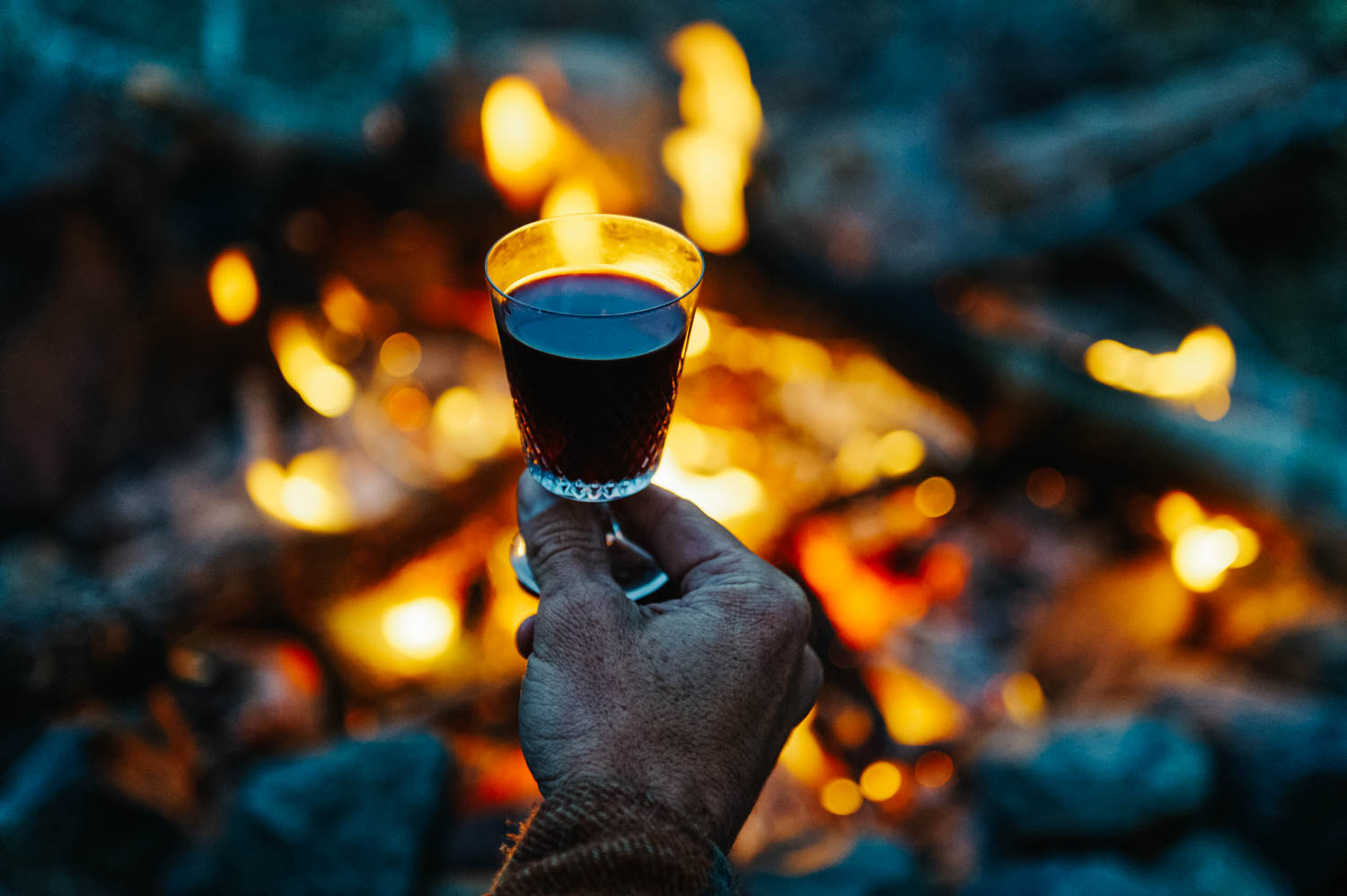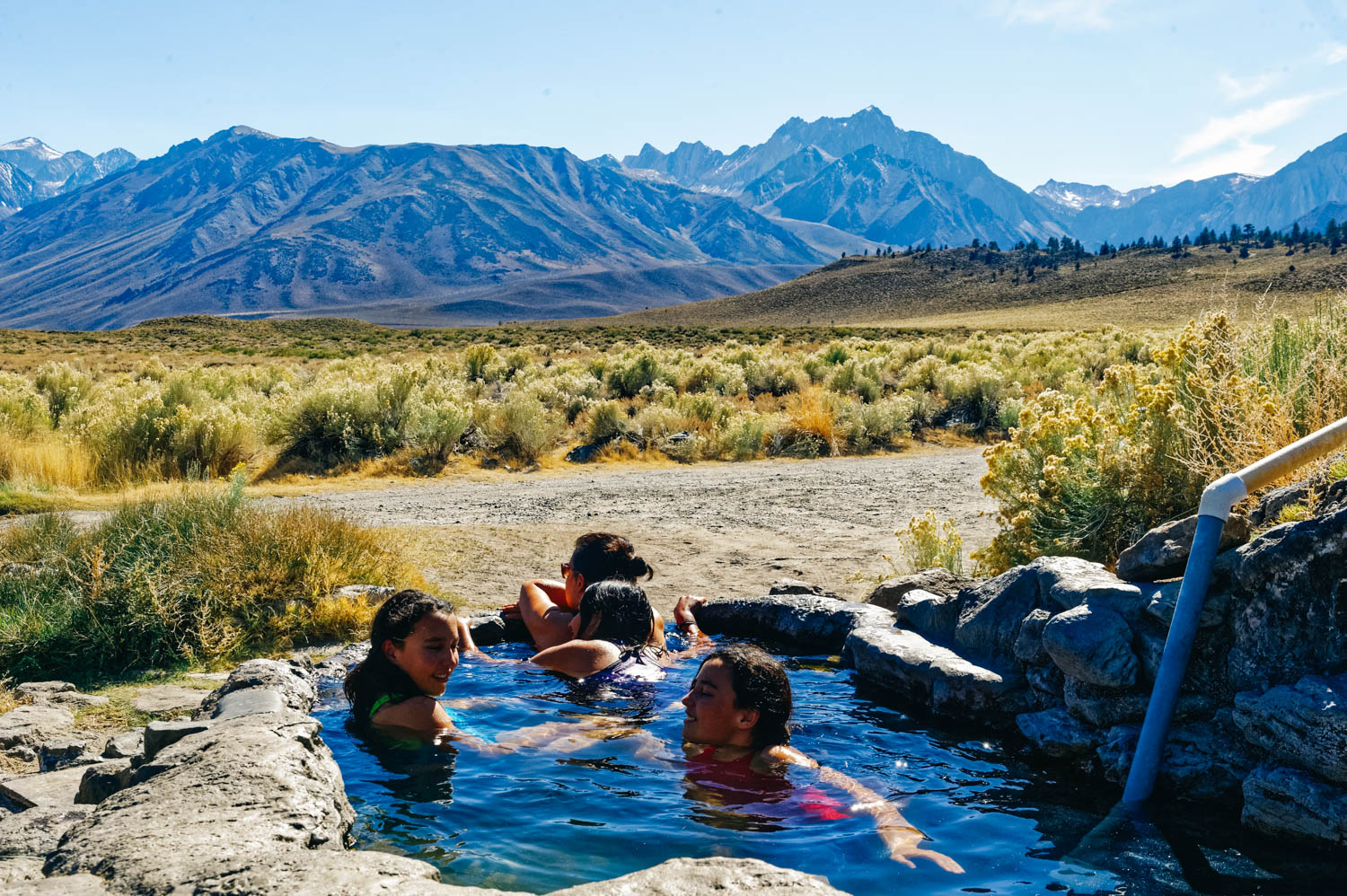The Mammoth Lakes area
Mulled wine is perfect for cold nights by the fire.
One morning, we woke up to snow!
Beautiful frost everywhere.
Rock tub hot springs.
Rock Tub hot springs.
Hot Creek is NOT a hot spring for swimming. See below.
We rode many times at Mammoth Mountain even if the bike park was officially closed for the season (no lifts), the trails remained open. It is at 9,000 feet in altitude and it was pretty cold. That's the day it was 3 degrees C (35 F). We ended our day at the Mammoth Brewery. Delicious beer and food. Don't miss it if you are in the area.
Devil's Postpile National Monument.
Devil's Postpile seen from above (left) and another cool basalt columns formation from the area on the right.
Exploring Obsidian Dome.
Full moon rise over our camp.
Rock climbing at Owens River Gorge.
The class 3 scramble approach to get to the crag at Owen River Gorge was quite something with big packs and a big dog!
Our free campsite at Shepard's hot springs.
You can see the bus in the distance.
Perfect way to start the day.
Or to end it.
The Crab Cooker was our favorite of the 3 hot springs we visited. It was also the cleanest (it looked like it had just been emptied and scrubbed). It was only a 5 minute walk from our camping spot at Shepard's Hot Spring. And yes, all this is on BLM land (and free!).
Walking back to camp from the Crab Cooker tub.
One of the things your learn after many years on the road is that if you find a gem of a secret spot to camp in, you don't share it on social medias or camping sites/apps. Another thing that you learn is that if there is a long weekend coming, you stay put. Even if you would really like to go climbing at Owens River Gorge and take advantage of that long weekend yourself (because no, we do not make our work schedule and have full days off only on weekends). On long weekends, you stay around camp and explore less popular spots. For your own sanity.
There is a lot to do in the Mammoth Lakes ares. There is an awesome bike resort with lots of amazing trails. Mammoth Mountain closes mid-September, but the trails remain open for riders to enjoy. At 9,000 feet of altitude, it can get cold at this time of year. We went riding in 3 degree C weather (that's 35 F). There is also a great brewery (Mammoth Brewery), perfect for an after-ride brew and delicious meal.
There are also many hot springs in the areas, the most popular being Hilltop (aka Pulkey's) and Wild Willy's. These are often full of people. The thing is, most of the springs are bathtub size and can sit 4 to 5 persons at most (Wild Willy being the exception, there are a few pools there that can accommodate more people), so if you get there and they are full, the courtesy is to leave (not wait there or worst, try to squeeze in). Many of these are clothing optional too.
We really liked Rock Tub since it is right by the little parking area and you don't have to hike to find out if it's full or not. The first time we tried to go to the hot springs, on a very cold night after our bike ride, we found it full, so we turned around, checked out Hilltop and Wild Willy's which were also full... It's the reality of it... It's high season here and there are not secret spots anymore. So we came back the next day in the afternoon and lucked out as the man bathing there was just done. During the hour we were there, 3 or 4 cars drove in, saw that the tub was busy and turned around. The water gets pretty dirty from all the people (even if there is a constant flow in and out. There is a plug at the bottom, so you can empty the tub and let it fill back up. You can also bring a brush to scrub the slippery algea that covers the bottom if you want. Obviously, don't use any soap in the tubs!
We also explored Shepard's Tub and the Crab Cooker, that are *a bit* less busy. We ended up camping there for 2 nights and enjoying Shepard's Tub and the Crab Cooker morning and night. It was heavenly after a day of climbing! If you decide to go camp near a hot spring, remember that this is a public place and do not hug the tub (or park very near it). People will likely come and go every hour or so (and at every hour of the night on weekends!), so be warned.
Hot Creek used to be a hot spring in the 60's and 70's. We met a man at Shepard's who used to be a guide and would bring tourists there. He said there was a huge pool where there was always 50 to 60 people. It has been closed for 15-20 years because too many deaths happen there. He told us that most deaths were caused by people trying to rescue their dogs who had fallen in the blue pools of death (the beautiful Icelandic blue pool in the picture above) which is and has always been scalding hot. It is nonetheless a geological wonder where the cold water from the glacier meet the bubbling water from the underground volcanic activity. The ground is unstable in the area because of fumaroles and occasional geyser action also.
Devils Postpile (a National Monument) is an unusual rock formation of 60 feet high basalt columns. It looks like a tidy lumber pile created by OCD giants. They were formed when lava erupted in the valley nearly 100,000 years ago and filled the area to a depth of 400 feet. Then, glaciers overrode the fractured mass of lava. As you can see on the pictures taken from the top, the glaciers cut the hexagonal basalt towers, leaving behind something that looks like a tile floor. The John Muir Trail and Pacific Crest Trail merge into one trail as they pass through the monument.
Obsidian Dome is not your typical cone-shaped dome, but more like a big pile of shiny black rock. It is indeed volcanic glass that was formed by an explosion (a Phreatic Blast) when magma reached the water table, turned the water to steam, cooled and then turned to rock. There is not much else to do there than to simply scramble up and look at the beautiful obsidian formations (be careful, it is slippery). Obsidian is the sharpest natural material known to man, obsidian rocks have played a significant role in the evolution of homo-sapiens' tool-making ability. During the Stone-Age and beyond, obsidian rocks have played a major part as primary cutting tools in many cultures.






















